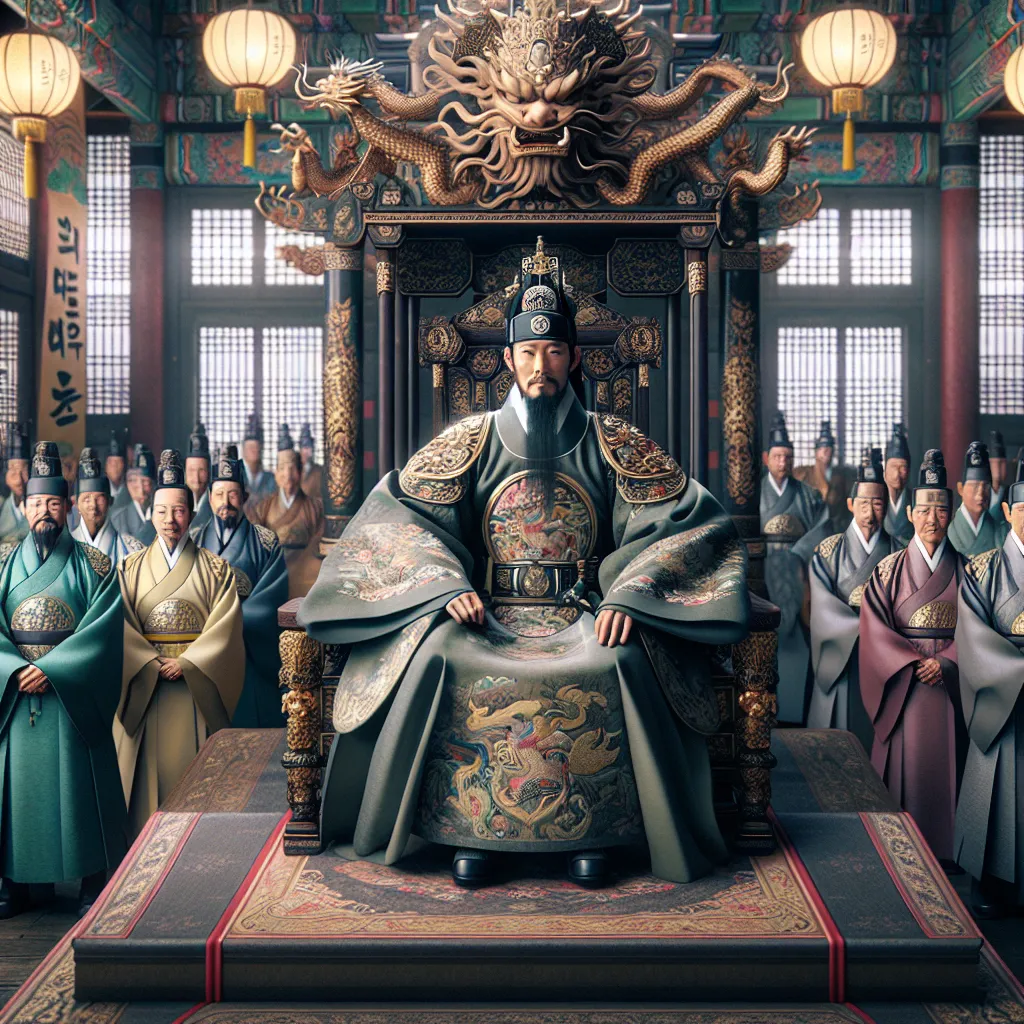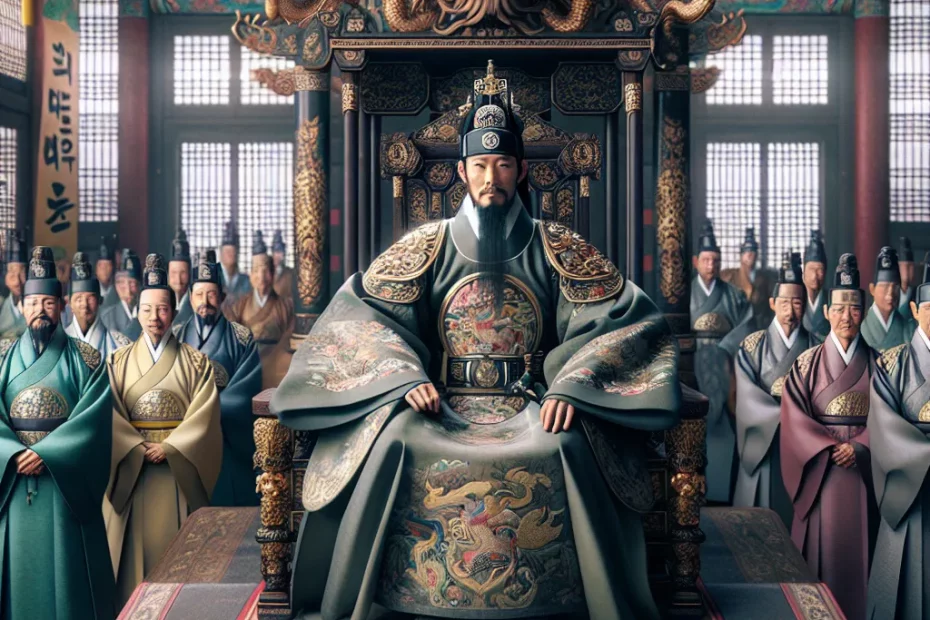King Taejo, the founder of the Joseon Dynasty and the unifier of Korea, left an indelible mark on Korean history with his remarkable achievements and enduring legacy. His early life, rise to power, establishment of the dynasty, and reign are all testaments to his vision and leadership. King Taejo’s reign was a pivotal period in Korean history, marked by political stability, cultural flourishing, and technological advancements. His legacy continues to shape Korea to this day, influencing its culture, society, and governance. King Taejo’s impact on Korean history is undeniable, making him a revered figure in the annals of Korean history.

King Taejo’s Early Life and Rise to Power
In the annals of Korean history, the name King Taejo shines brightly as the founder of the illustrious Joseon Dynasty, a pivotal figure who unified the Korean peninsula after centuries of division and strife. Born as Yi Seong-gye in 1335, King Taejo‘s early life was marked by his exceptional military prowess and strategic acumen, traits that would later propel him to the throne and shape the course of Korean history.
Early Military Success
As a young nobleman in the Goryeo dynasty, Yi Seong-gye distinguished himself on the battlefield, leading successful campaigns against various rebellions and foreign invasions. His military achievements not only earned him the respect of his peers but also caught the attention of the ruling elite. With each victory, Yi Seong-gye‘s reputation as a brilliant tactician and fearless leader grew, laying the foundation for his meteoric rise to power.
Establishment of the Joseon Dynasty
In 1392, amidst political turmoil and internal strife within the Goryeo dynasty, Yi Seong-gye seized the opportunity to make his mark on history. In a bold and daring move, he led a coup d’état that culminated in the establishment of the Joseon Dynasty, with himself as its inaugural monarch, King Taejo. This audacious act not only solidified his place as a visionary leader but also set in motion a series of reforms that would transform Korea into a prosperous and culturally rich nation.
King Taejo‘s ascent to the throne marked the beginning of a new era for Korea, one characterized by stability, innovation, and a renewed sense of national identity. Through his strategic vision and unwavering determination, he laid the groundwork for the Joseon Dynasty’s enduring legacy, shaping the course of Korean history for centuries to come.
The legacy of King Taejo, the visionary founder of the Joseon Dynasty and unifier of Korea, continues to inspire generations of Koreans to this day. His early life marked by military triumphs and his rise to power through sheer determination and strategic brilliance serve as a testament to the indelible mark he left on Korean history. King Taejo‘s legacy is not just a chapter in history books; it is a living testament to the power of leadership, vision, and unwavering dedication to the greater good.
Establishment of the Joseon Dynasty
In the annals of Korean history, the establishment of the Joseon Dynasty stands as a monumental moment that shaped the course of the nation for centuries to come! Founded by King Taejo, also known as Yi Seong-gye, in 1392, the Joseon Dynasty replaced the Goryeo Dynasty and ushered in a new era of governance, culture, and societal norms in the Korean Peninsula. 🌟
King Taejo’s Vision
King Taejo’s vision of a unified Korea under a new ruling house was realized after years of political maneuvering and military conquests. With a strong emphasis on Confucian principles, the Joseon Dynasty sought to establish a centralized bureaucratic system that would govern the country with fairness and efficiency. 🏛️
Legal Code Implementation
One of the key aspects of the Joseon Dynasty’s establishment was the implementation of the “Gyeongguk daejeon,” a comprehensive legal code that laid out the laws and regulations of the new dynasty. This legal framework provided a solid foundation for governance and ensured that justice was administered impartially throughout the kingdom. 📜
Flourishing Dynasty
Under King Taejo’s leadership, the Joseon Dynasty flourished, with advancements in various fields such as agriculture, science, and the arts. The capital city of Hanyang (modern-day Seoul) became a hub of culture and learning, attracting scholars and artists from all corners of the kingdom. 🌆
The Joseon Dynasty’s establishment marked a turning point in Korean history, setting the stage for centuries of cultural achievements, technological innovations, and diplomatic endeavors. King Taejo’s legacy as the founder of the dynasty and the unifier of Korea remains etched in the hearts of the Korean people to this day. 👑
In conclusion, the establishment of the Joseon Dynasty under the visionary leadership of King Taejo was a pivotal moment that shaped the destiny of Korea and left an indelible mark on its history. Through his efforts, King Taejo laid the groundwork for a prosperous and culturally rich kingdom that would endure for over five centuries. Let us remember and honor the legacy of King Taejo, the founding father of the illustrious Joseon Dynasty! 🇰🇷
King Taejo’s Reign and Achievements
In the annals of Korean history, King Taejo stands as a towering figure, revered as the founder of the Joseon Dynasty and the unifier of Korea. Born as Yi Seong-gye in 1335, he rose to prominence through his military prowess and visionary leadership. Ascending to the throne in 1392, he ushered in a new era marked by stability, cultural flourishing, and diplomatic achievements that would leave an indelible mark on the Korean peninsula for centuries to come. 🌟
Reforms and Governance
During his reign, King Taejo implemented sweeping reforms that laid the foundation for the Joseon Dynasty’s enduring success. He centralized power, established a merit-based bureaucracy, and promulgated a legal code that emphasized justice and fairness. Under his wise governance, the kingdom prospered, and the arts and sciences thrived. 📜
Establishment of Hangeul
One of King Taejo’s most notable achievements was the establishment of Hangeul, the Korean alphabet. Recognizing the importance of literacy and the need for a writing system accessible to all, he commissioned the creation of Hangeul in 1443. This innovation revolutionized Korean culture, enabling greater literacy rates and the preservation of Korean language and heritage. 📚
Diplomatic Achievements
On the diplomatic front, King Taejo’s astute policies ensured peace and stability in the region. He maintained friendly relations with neighboring countries, fostering trade and cultural exchange. His efforts to promote diplomacy and mutual understanding laid the groundwork for Korea’s future diplomatic endeavors. 🤝
Military Victories
In the realm of military affairs, King Taejo’s strategic acumen and leadership were unparalleled. He successfully repelled invasions from the Jurchen tribes and other hostile forces, securing Korea’s borders and safeguarding its sovereignty. His military victories solidified his reputation as a formidable ruler and a defender of the realm. ⚔️
King Taejo’s legacy as a unifier, reformer, and visionary leader endures to this day. His contributions to Korean history are immeasurable, shaping the destiny of the nation and inspiring future generations to strive for greatness. As we reflect on his reign and achievements, we are reminded of the enduring power of leadership, innovation, and perseverance in shaping the course of history. 👑
Legacy and Impact on Korean History
The legacy of King Taejo, the visionary founder of the Joseon Dynasty and the unifier of Korea, continues to shape the course of Korean history to this day. Born as Yi Seong-gye in 1335, King Taejo’s remarkable leadership and strategic prowess transformed the Korean Peninsula, leaving an indelible mark on the nation’s history.
King Taejo’s Ascension
👑 King Taejo’s ascension to the throne in 1392 marked the beginning of a new era for Korea. By establishing the Joseon Dynasty, he laid the foundation for over five centuries of stability and prosperity in the region. His vision for a centralized government, based on Confucian principles, set the stage for significant cultural and societal developments that endure in Korea’s identity.
Unification of Korea
🌟 The unification of Korea under King Taejo’s rule brought an end to years of internal strife and conflict, fostering a sense of national unity and pride among the Korean people. His military campaigns and diplomatic acumen solidified his position as a revered figure in Korean history, earning him the title of the “Great King of Joseon.”
Architectural Marvels
🏛️ King Taejo’s legacy is also evident in the architectural marvels he commissioned, such as Gyeongbokgung Palace, which stands as a testament to the grandeur and sophistication of the Joseon Dynasty. These cultural landmarks serve as a reminder of King Taejo’s enduring influence on Korean art and architecture.
Enduring Impact
📜 Beyond his achievements during his reign, King Taejo’s legacy extends to the present day through the enduring impact of the Joseon Dynasty on Korean society. The bureaucratic system he implemented, known as the “gwageo,” shaped the governance of Korea for centuries, emphasizing meritocracy and intellectual achievement.
Promotion of Confucian Ideals
🌺 Additionally, King Taejo’s promotion of Confucian ideals and the arts laid the groundwork for Korea’s rich cultural heritage, influencing literature, music, and traditional customs that are cherished to this day. His emphasis on education and scholarship fostered a culture of learning that continues to define Korean intellectual pursuits.
Regional Dynamics
🌏 In the broader context of East Asian history, King Taejo’s unification of Korea played a pivotal role in shaping regional dynamics and influencing diplomatic relations. His legacy as a unifier and visionary leader reverberates across centuries, underscoring the enduring significance of his contributions to Korean history.
King Taejo’s legacy as the founder of the Joseon Dynasty and the unifier of Korea remains a cornerstone of Korean identity, symbolizing the resilience, vision, and cultural richness of the Korean people. His impact on Korean history is profound and far-reaching, a testament to the enduring legacy of a remarkable leader who shaped the course of a nation.
King Taejo, the founder of the Joseon Dynasty, left an indelible mark on Korean history through his visionary leadership and unification of the Korean Peninsula. His early struggles and rise to power showcase his determination and strategic acumen. The establishment of the Joseon Dynasty under his rule marked a new era of stability and prosperity for Korea. King Taejo’s reign was characterized by reforms that laid the foundation for a strong and centralized government. His legacy continues to resonate in modern Korea, shaping the country’s culture, politics, and identity. King Taejo’s enduring impact as a unifier and nation-builder solidifies his place as a revered figure in Korean history.
